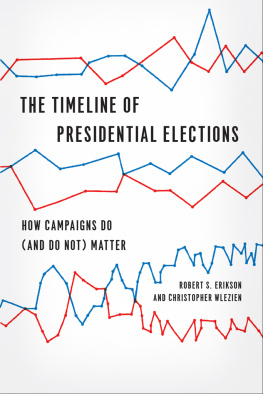Election Meltdown

Copyright 2020 by Richard L. Hasen.
All rights reserved.
This book may not be reproduced, in whole or in part, including illustrations, in any form (beyond that copying permitted by Sections 107 and 108 of the U.S. Copyright Law and except by reviewers for the public press), without written permission from the publishers.
Yale University Press books may be purchased in quantity for educational, business, or promotional use. For information, please e-mail (U.K. office).
Set in Gotham and Adobe Garamond type by IDS Infotech Ltd., Chandigarh, India.
Printed in the United States of America.
Library of Congress Control Number: 2019945878
ISBN 978-0-300-24819-7 (hardcover : alk. paper)
A catalogue record for this book is available from the British Library.
This paper meets the requirements of ANSI/NISO Z39.48-1992 (Permanence of Paper).
10 9 8 7 6 5 4 3 2 1
For Deborah, Shana, and Jared, still waiting for a voting system befitting our great democracy but seeing things getting worse rather than better
Contents
Acknowledgments
As always, I benefited greatly from the expertise and wisdom of generous readers. I thank the following people who read all or parts of the manuscript: Bob Bauer, Doug Chapin, Erwin Chemerinsky, David Ettinger, Ned Foley, Howard Gillman, Jared Hasen-Klein, Dale Ho, Steve Kay, Ron Klain, Brendan Nyhan, Norm Ornstein, Kyhm Penfil, Rick Pildes, Nick Stephanopoulos, Adam Winkler, my University of California, Irvine, colleagues who participated in a faculty workshop, and the anonymous readers for Yale University Press. Thanks also to Joan Biskupic, Jackie Calmes, Jill Grinberg, Justin Levitt, and Hunter Walker for useful comments and suggestions. Although the book is much improved thanks to early readers, I take full responsibility for remaining errors.
Thanks to Bill Frucht of Yale University Press, who encouraged me to pursue this project and improved it greatly with his suggestions, to Karen Olson at the press for help with all manner of logistical issues, to Robin DuBlanc and Margaret Otzel for excellent production assistance, and to my agent Melissa Flashman, whose smarts and initiative helped bring this book to life.
Julia Jones provided excellent research assistance, with additional cite-checking help from Hannah Bartlett, Tim Duong, Jack Feinfield, and Sabrina Van Der Linden-Gonzales. Stacy Tran provided professional and terrific administrative assistance, and Ellen Augustiniak, Dianna Sahhar, and Christina Tsou provided first-rate library support.
Most of all, I thank my wife, Lori Klein, for her excellent comments on the manuscript as well as her unwavering support, sage advice, love, and patience. Her support makes everything possible. This book is dedicated to our most successful joint endeavors.
Some of the material in this book appeared in altered form in some earlier writing of mine. I gratefully acknowledge permission to reprint parts of these works:
Donald Trump Was Just Handed a Chance to Supercharge Voter Suppression in 2020, Slate, Jan. 8, 2019, https://slate.com/news-and-politics/2019/01/donald-trump-voter-suppression-plan-2020.html
Race or Party?; How Courts Should Think about Republican Efforts to Make It Harder to Vote in North Carolina and Elsewhere, 127 Harvard Law Review Forum 58 (2014), https://harvardlawreview.org/2014/01/race-or-party-how-courts-should-think-about-republican-efforts-to-make-it-harder-to-vote-in-north-carolina-and-elsewhere/
Race or Party, Race as Party, or Party All the Time: Three Uneasy Approaches to Conjoined Polarization in Redistricting and Voting Cases, 59 William and Mary Law Review 1837 (2018)
The 2016 U.S. Voting Wars: From Bad to Worse, 26 William & Mary Bill of Rights Journal 629 (2018)
Vote Suppressors Unleashed, Slate, Nov. 27, 2017, https://slate.com/news-and-politics/2017/11/donald-trump-will-supercharge-voter-suppression-if-the-rnc-consent-decree-falls.html
The Voting Wars: From Florida 2000 to the Next Election Meltdown (Yale University Press 2012)
Why Democrats Should Not Call the Georgia Governors Race Stolen, Slate, Nov. 18, 2018, https://slate.com/news-and-politics/2018/11/georgia-stacey-abrams-brian-kemp-election-not-stolen.html.
Thanks to David Smiley for permission to republish his photograph of the Broward County, Florida, 2018 ballot; to the Associated Press for permission to publish an altered version of Damian Dovarganes, AP Images, California Hispanics, http://www.apimages.com/metadata/Index/California-Hispanics/41af1e6fdfec4e45adcc2efdcbe6e571/36/0 (August 15, 2012); and to Jeff Giesea, who posted portions of the leaked Project Birmingham After-Action Report.

Occasionally I altered capitalization and eliminated internal quotation marks for clarity. Check the original source before quoting secondary sources here. I saved endnote references for the end of a paragraph. Paragraphs containing quotations without citation refer to material cited in the earlier notes.
Election Meltdown
I N T R O D U C T I O N
The New Voting Wars
Mr. President, why havent you condemned ... the North Carolina election fraud? This is a big story. The Republican candidate is calling for a new election. Why have you not condemned that, given youve condemned other kinds of voter fraud?
Hallie Jackson, chief White House correspondent for NBC News, queried President Donald J. Trump during a February 2019 opportunity for press questions in the Oval Office before a trade meeting between U.S. and Chinese government officials. Just a day earlier, Mark Harris, a Republican congressional candidate who was 905 votes ahead of Democrat Dan McCready in the uncalled 2018 race for North Carolinas Ninth Congressional District, surprisingly agreed to McCreadys call for a new election. He did so after a North Carolina election board heard overwhelming evidence that one of Harriss consultants, Leslie McCrae Dowless Jr., had engaged in illegal campaign activities such as forging absentee ballots. For Harris, who had spent many weeks demanding that the board declare him the winner and claiming that the Democrats and liberal media have spared no expense disparaging my good name, it was a change of heart.
At the election board hearing, Harriss son John, an assistant U.S. attorney, had testified about emails he had sent his father. Before his father hired Dowless, John warned that the consultant appeared to have engaged in illegal ballot activities during previous elections.
The reporters question to Trump was prompted by the presidents relentless and unproven past claims of massive voter fraud committed by Democrats. Without evidence, he had charged that millions of noncitizens voted in the 2016 elections. He had claimed that voter impersonation fraud, where one person goes to a polling place and votes in anothers name, was a major problem, despite all evidence to the contrary. He had accused Brenda Snipes, a Democratic election official in Broward County, Florida, of trying to steal the 2018 U.S. Senate election from Republican Rick Scott, who was challenging incumbent Democratic senator Bill Nelson. But Trump had been silent about the North Carolina race, the first credible case in decades of criminal conduct potentially affecting the outcome of a federal election.
Trumps meandering answer to Jackson was full of unsupported claims:
PRESIDENT TRUMP: Well, I condemn any election fraud. And when I look at whats happened in California with the votes, when I look at what happenedas you know, there was just a case where they found a million fraudulent votes. When I look at whats happened in Texas
Next page
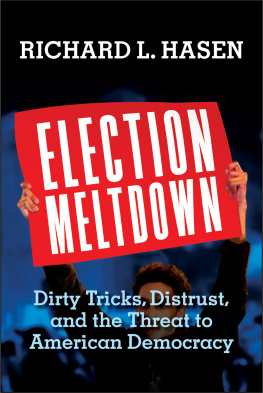
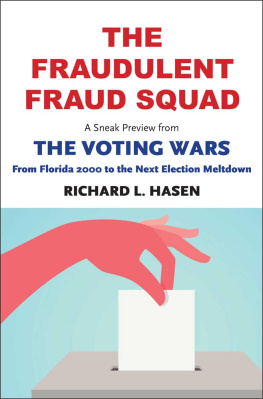

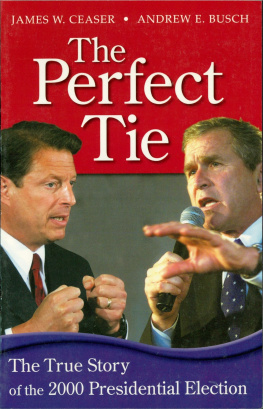
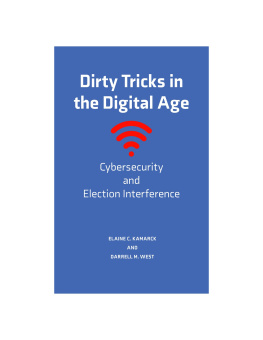
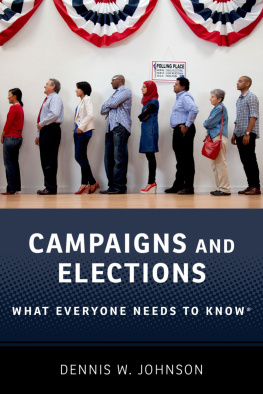
![T. H. Logwood - Voter Fraud and the 2020 Presidential Election; “Joe Biden wins by a Miraculous Landslide” [with appendices]](/uploads/posts/book/259666/thumbs/t-h-logwood-voter-fraud-and-the-2020.jpg)
